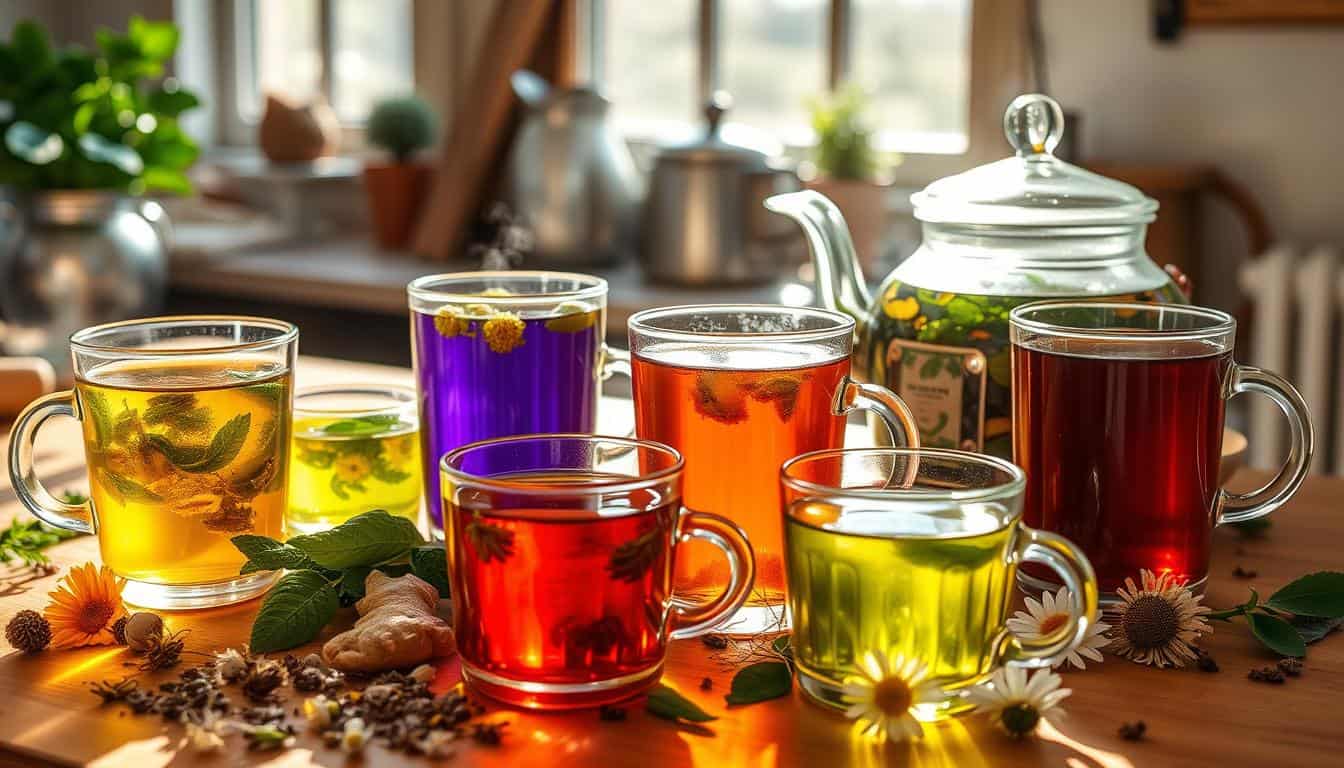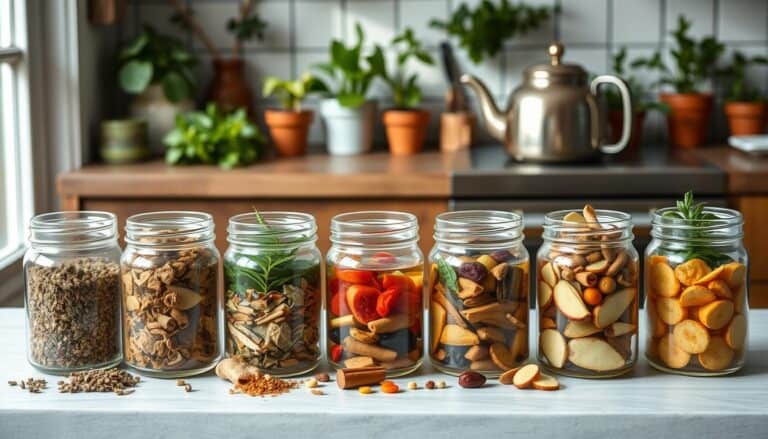5 Herbal Tea Recipes for Digestive Health
This post may contain affiliate links which means I may receive a commission for purchases made through links at no extra cost to you. I only recommend products I truly believe in. Thank you for your support!
Herbal teas are a natural way to help your digestive system. Peppermint tea relaxes the muscles in your stomach and can reduce bloating. Ginger tea helps your body absorb food better and can fight off nausea.
Cinnamon tea helps control blood sugar and gets digestion going. Lemongrass tea, with its citral, can ease constipation and boost gut health. Chai tea, with ginger and black pepper, speeds up digestion of heavy foods.
Try these five herbal tea recipes to improve your digestive health. They offer a natural way to feel better.
Introduction to Herbal Teas for Digestion
Herbal teas are a natural way to help your digestion. They are made from plants and can directly reach your digestive system. This can help soothe, heal, and balance your gut.
They can reduce inflammation and help wounds heal. Adding herbal teas to your routine can be very beneficial for your gut health.
Benefits of Herbal Teas
Herbal teas are full of compounds that help your digestion. Mucilaginous herbs like marshmallow root and slippery elm bark can reduce inflammation. They also help heal the GI lining.
Demulcent herbs like licorice root and plantain leaf offer soothing effects. Vulnerary herbs such as calendula and plantain leaf help wounds heal in the GI tract. Gentle astringent herbs like rose petals and cinnamon tighten and tone the digestive lining.
Key Ingredients for Digestive Health
- Anti-inflammatory Teas: Teas with herbs like ginger, turmeric, and chamomile reduce inflammation. They help with conditions like IBS and IBD.
- Gut-Soothing Teas: Herbs like marshmallow root, slippery elm, and licorice soothe and heal the gut lining. They address acid reflux, gastritis, and ulcers.
- Digestive Stimulant Teas: Teas with herbs like fennel, peppermint, and dandelion root promote healthy digestion. They help with bloating and support regular bowel movements.

By adding these herbal teas to your daily routine, you can use nature’s power. It supports your gut health and overall well-being.
Recipe 1: Peppermint Tea for Relaxation
Peppermint tea is a great choice for those who want to avoid caffeine. It helps move gas through your body, preventing bloating and discomfort. Peppermint is also known to help with nausea and is used to manage IBS symptoms.
Ingredients Needed
- 8 oz. of hot water
- 1 peppermint tea bag
- 3 muddled basil leaves
- 1 teaspoon of honey
Preparation Instructions
- Bring 8 oz. of water to a boil.
- Place the peppermint tea bag into a cup.
- Muddle the basil leaves in the cup to release their aroma and flavor.
- Pour the hot water over the tea bag and basil leaves.
- Steep the mixture for 5-10 minutes.
- Stir in 1 teaspoon of honey to taste.
- Enjoy your soothing and digestive-friendly peppermint tea.
A study found that 75% of people with IBS felt better after taking peppermint oil capsules. The antioxidants in peppermint tea also help with digestion by enhancing bile production. This makes peppermint tea a natural, caffeine-free choice for digestive health.
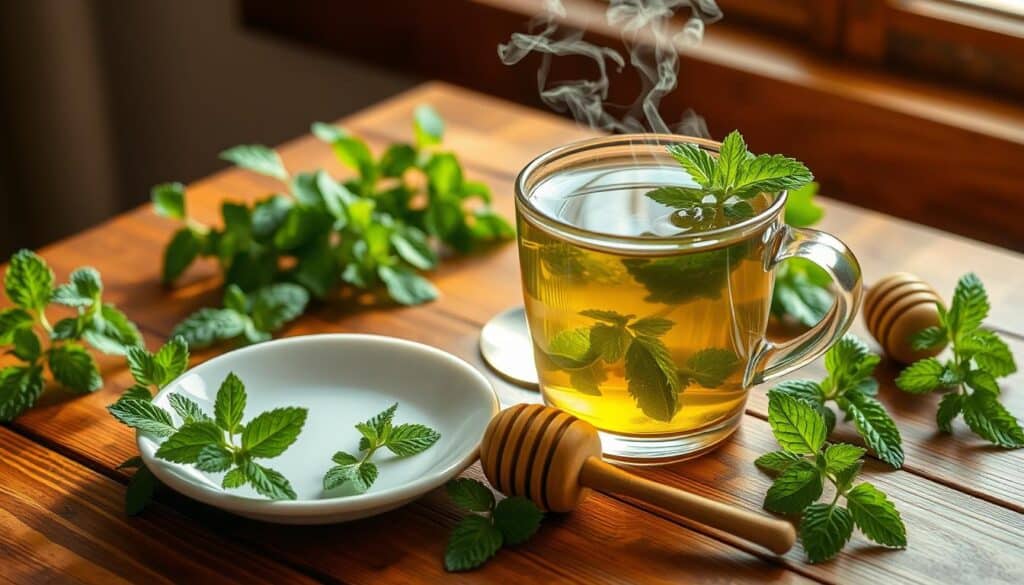
Peppermint tea recipes can be made in many ways, like iced tea or with ginger. You can also try homemade chocolate mint tea or fruit-infused peppermint tea. Its refreshing taste and health benefits make it a favorite for many.
Recipe 2: Ginger Tea for Nausea Relief
Ginger tea is famous for its healing powers, especially in digestion and nausea relief. This aromatic, spicy-sweet drink has been loved for over 5,000 years. It’s a key remedy in traditional medicine.
Ingredients Required
- 1-2 inches fresh ginger root, peeled and sliced or grated
- 4 cups water
- Honey or lemon juice (optional)
How to Make Ginger Tea
Making ginger tea is easy. First, boil water in a saucepan. Then, add the sliced or grated ginger. Lower the heat and let it steep for 10-15 minutes.
For a sweeter or tangier taste, add honey or lemon juice. The mix of ginger, honey, and lemon makes a soothing drink. It helps calm an upset stomach and eases nausea.
Ginger tea is great for digestive problems like IBS and morning sickness. Its strong anti-inflammatory effects help with nausea, vomiting, and stomach pain.
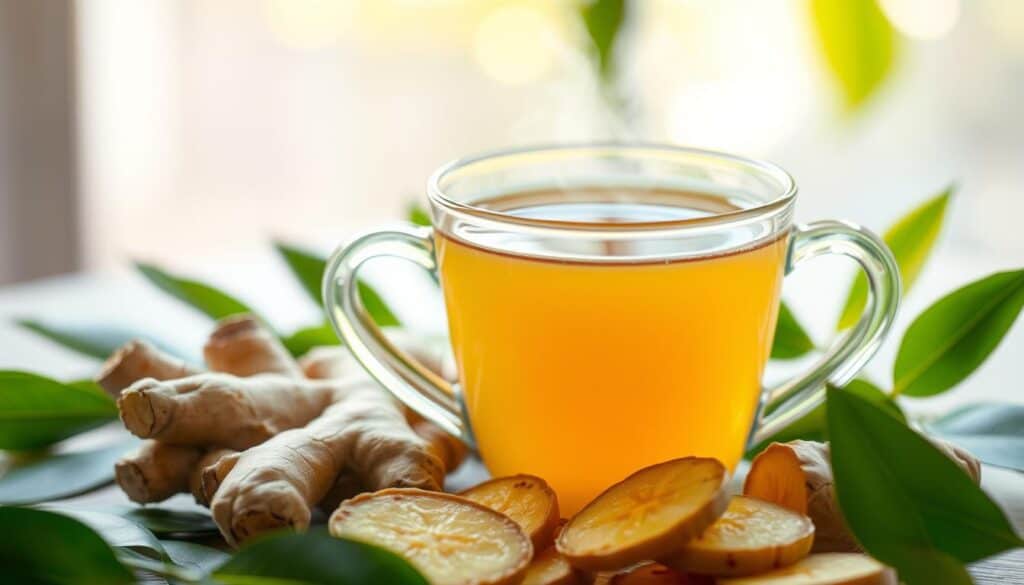
Always talk to a healthcare expert before trying new herbal remedies, especially if you have health issues or take medicines. Enjoy ginger tea’s calming effects and support your digestive health.
Recipe 3: Chamomile Tea for Calm Digestion
Chamomile tea is a gentle yet powerful herbal remedy. It’s known for calming the digestive system. This soothing tea can help reduce inflammation, ease stomach cramps, and promote relaxation.
What You Need
- 1 chamomile tea bag or 1 tablespoon of dried chamomile flowers
- 1 cup of hot water
- Optional: a slice of lemon or a teaspoon of honey for added flavor and benefits
Step-by-Step Brewing Guide
- Bring the water to a gentle boil.
- Place the chamomile tea bag or dried flowers in a mug or teapot.
- Pour the hot water over the chamomile and let it steep for 5-7 minutes.
- If desired, add a slice of lemon or a teaspoon of honey to enhance the flavor and provide additional health benefits.
- Sip and enjoy your calming chamomile tea for a peaceful digestive experience.
Chamomile has been used for centuries as a natural remedy for various digestive issues. Its anti-inflammatory properties and ability to soothe the gut make it a go-to choice for anyone seeking calm digestion or relief from occasional stomach discomfort. Incorporate this simple herbal remedy into your daily routine for a comforting and nourishing tea experience.
Recipe 4: Fennel Tea for Bloating Relief
Fennel tea is a natural way to reduce bloating and support your digestive health. It’s full of fiber, which helps prevent constipation and keeps your bowels regular. Fennel also has compounds that can stop immune cells in the gut that cause bloating and gas.
Essential Ingredients
- 1-2 teaspoons of crushed fennel seeds
- 1 cup of hot water
- Optional: Ginger slices or lemon wedge for added flavor and benefits
Brewing Instructions
- Bring the water to a boil in a small saucepan or kettle.
- Add the crushed fennel seeds to a teapot or heat-safe mug.
- Pour the hot water over the fennel seeds and let the tea steep for 7-10 minutes.
- Strain the tea to remove the fennel seeds, if desired.
- Enjoy the fennel tea warm, either on its own or with a slice of ginger or a squeeze of lemon for additional digestive support.
For a larger batch, use 2-3 teaspoons of fennel seeds per 2 cups of hot water. Steep the tea for the same duration, then strain and store in the refrigerator for up to 3 days. Drink the fennel tea chilled or reheated after meals to help relieve bloating and support healthy digestion.
Remember to stay hydrated and eat a balanced diet rich in fiber. This will help the fennel tea work better. If you have persistent or severe bloating, see a healthcare professional for advice and to check for any health issues.
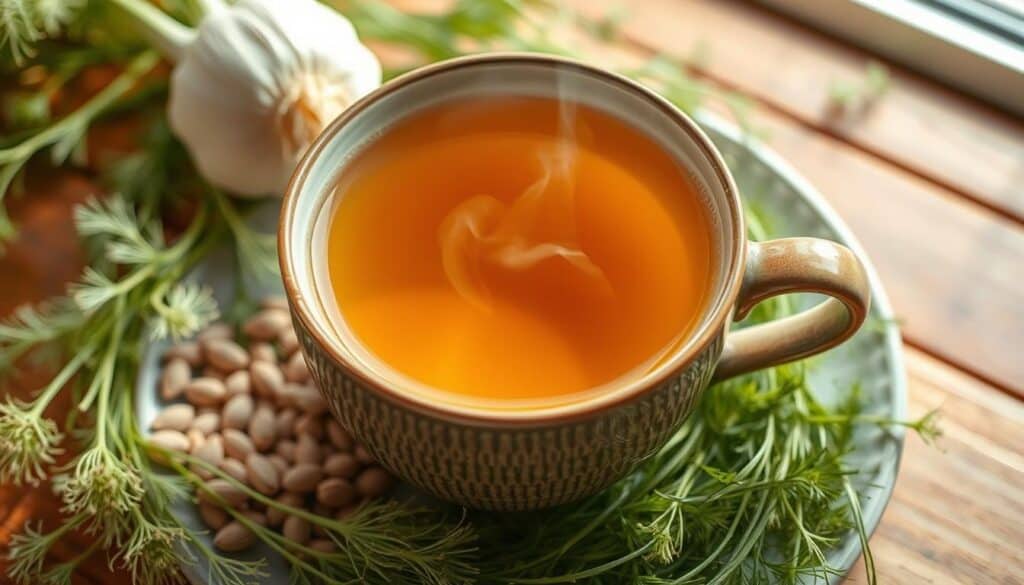
Recipe 5: Dandelion Root Tea for Detoxification
Discover the natural detoxifier in a warm cup of dandelion root tea. This herb boosts liver function and detoxifies your body. It’s full of antioxidants and vitamins that aid digestion, ease constipation, and improve gut health.
Ingredients Overview
- 1-2 teaspoons of dried dandelion root
- 1 cup of water
- Optional: Honey or lemon for flavor
Preparation Method
- Bring the water to a boil in a small saucepan.
- Add the dried dandelion root to the boiling water.
- Reduce the heat and let the tea simmer for 5-10 minutes.
- Strain the tea to remove the dandelion root pieces.
- Add a touch of honey or a squeeze of lemon to taste, if desired.
- Enjoy your cup of detoxifying dandelion root tea!
Studies show that dandelion root’s antioxidants and polysaccharides support liver health and detox. Drinking dandelion tea can also help increase urine output, flushing out toxins.
Be careful with dandelion root tea, especially if you’re on medications. Always talk to your doctor before trying new herbal teas. Let dandelion root tea help you keep your gut healthy and your body balanced.
Conclusion: Embrace Herbal Teas for Better Digestion
Herbal teas are a natural way to support your digestive health. They offer a soothing approach to common issues like nausea, bloating, and constipation. By adding these teas to your daily routine, you tap into the healing power of ancient plants.
Tips for Optimal Results
For the best results, drink herbal teas regularly. Try different blends to find what works for you. Steeping your tea longer helps get more of the good stuff. Also, eating a healthy diet can boost the tea’s benefits.
When to Seek Medical Advice
Herbal teas are usually safe, but see a doctor if your digestive problems don’t go away. This is especially true for long-term issues like Irritable Bowel Syndrome or stomach ulcers. A healthcare professional can offer tailored advice and check for any serious health issues.
